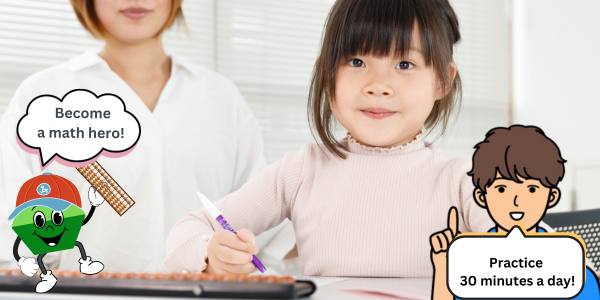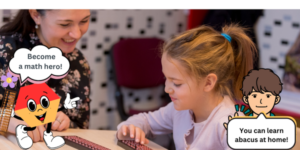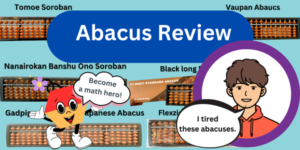As the new school year approaches, many parents are probably considering extracurricular activities for their children. If you have kids from preschool to about third grade, I highly recommend introducing them to the Japanese abacus. Extracurricular activities are a great opportunity for children to learn things not typically covered in school, like sports, music, art, and foreign languages. They are not just about having fun but also about improving skills in those areas. Here are some reasons why the abacus makes an excellent extracurricular activity:
1. Develops Early Math Skills
Using an abacus helps young children build a strong foundation in number sense and calculation. The earlier they start, the better they’ll grasp and enhance these essential math skills. Just as kids learn to count using their fingers or objects, they can quickly learn and grow with the abacus. As they become proficient, they’ll effortlessly manage larger numbers.
2. Flexible Practice Time and Saves Commute Time
You don’t have to drive to an abacus class (if there’s one in your city), so you save on travel time. Unlike other extracurricular activities that often involve significant commuting, your child can learn the abacus right at home whenever it fits your schedule. You can decide when to start and how long to practice, giving you full control over your child’s learning time.
3. Only 30 Minutes of Practice a Day
Unlike abacus classes where kids need to sit quietly for about 75 minutes, or stay focused for 40-60 minutes in online classes—both of which can be challenging for younger children—practicing at home takes just 30 minutes a day. From my experience, younger children often focus best in short bursts of about 10-15 minutes. That’s why practicing for 30 minutes daily, or breaking it into two 15-minute sessions, works well. This short, regular practice can make a big difference! Especially for younger kids or those new to abacus, making learning enjoyable is key. As they become familiar with the abacus and gain confidence, they’ll develop their skills more quickly.
4. Cost-Effective
Learning abacus at home is a cost-effective option compared to many other extracurricular activities. Beginners can start with an affordable plastic abacus, costing around $10. You’ll also need a textbook, which you can find on my website, including free workbooks (1 & 2) with a total of 1,150 problems! Visit my lesson page to explore new topics and practice these problems. If your child continues to show interest and progress, you might later consider investing in a high-quality wooden Japanese abacus, typically priced between $30 and $60. These durable abacuses can last for years, and many kids become proficient within a few months, mastering quick and smooth bead movements.
5: Additional Benefits
Boosts Math Skills and Confidence
Practicing with the abacus regularly can really boost your child’s math skills and help them develop a love for numbers. These skills are great for their future in math and STEM subjects. Plus, it helps them improve their concentration and patience. With time, they’ll gain confidence and enjoy learning even more. By getting good at the abacus, they’re setting themselves up for success and growing into confident, eager learners!
Summary
The Japanese abacus provides a fun and effective way to develop essential math skills and foster your child’s growth in other important areas. By choosing to learn the abacus at home, you can benefit from flexible practice times, eliminate commuting hassles, and make the most of budget-friendly resources. Start today and watch your child flourish as they build math skills, concentration, patience, and confidence—all from the convenience of home!




